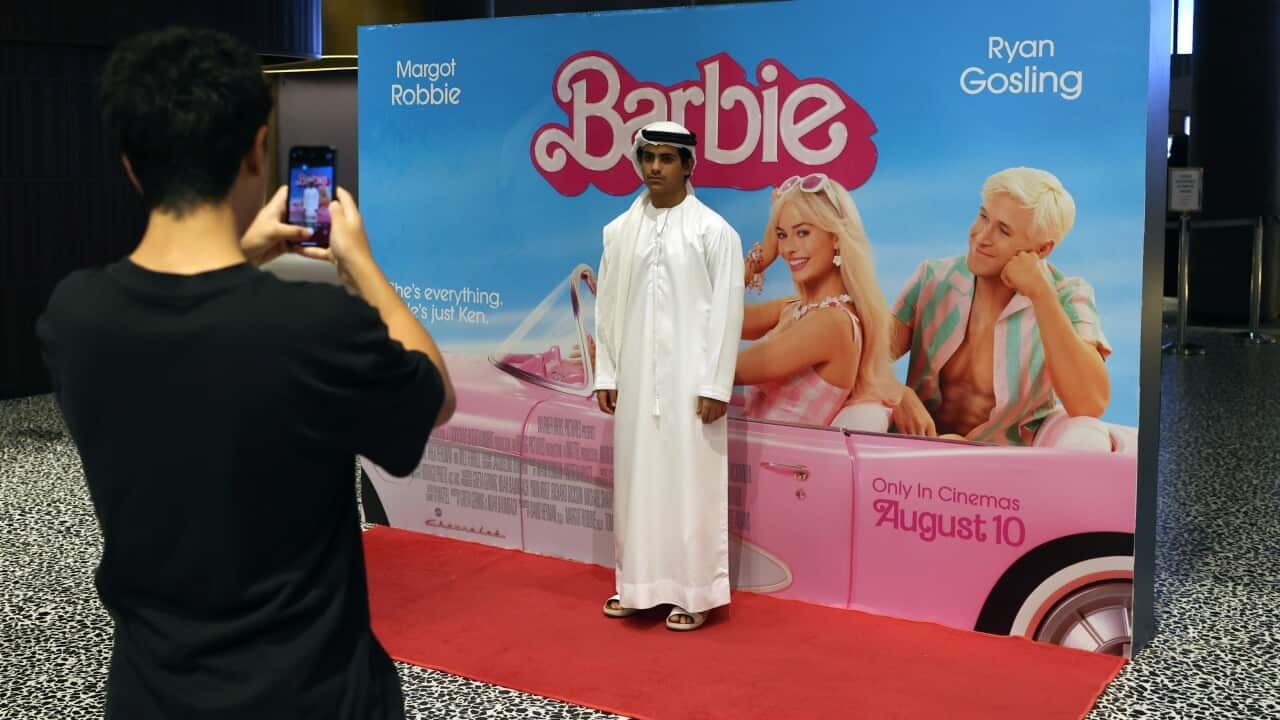TRANSCRIPT
Song lyrics: "Hiya Barbie. Hi Ken. Wanna go for a ride? Sure Ken. Jump in. I'm a Barbie girl, in a Barbie world, life in plastic, it's fantastic."
She's a Barbie girl in a Barbie world, but not in Kuwait and Lebanon where the film is now banned.
While the movie doesn't openly reference same-sex relationships or queer themes, Lebanon's government feels it promotes homosexuality.
Authorities in Kuwait are concerned about public ethics.
In Lebanon, some people have condemned the ban.
Lebanese producer Lary Bou Safi says it is outdated.
"Many things were always being banned in Lebanon for certain reasons - but it's been two years that there is like a campaign against culture, by blindly banning everything. We are going backwards a lot in this subject and this doesn't give us hope at all, for the culture scene in the country - a country that has always been the face culture in the Arab world. We may have become among the last ones in culture, due to how backwards we are going."
Lebanese film-maker Jean-Claude Boulos agrees.
“We got to a point where we are worst than before, we are closing down, we are hiding behind our values but other things are happening that are against our values... People would have to pay to go watch this movie in theatre while on the other hand, we have Netflix, shows on TV with all types of contents, from LGBT, women empowerment, to terrorism - everything is available and open, anyone can watch it."
"I am against banning any movies in general. The principle of banning is, in my opinion, a regressive principle and those who don't want to watch a movie can just not watch it, no one is obliging anyone to watch anything. Anyway, take me for example, I watched the movie and it is not out in Lebanon, I watched it online. Those who want to watch the movie will watch the movie."
Lebanon's culture minister imposed the ban.
He's backed by the powerful Shi'ite armed group Hezbollah.
Its head, Sayyed Hassan Nasrallah, has ramped up his rhetoric against the LGBTIQ+ community.
In a recent 46-minute speech he referred to Islamic texts that he said called for offenders to be punished with death.
“In the case of homosexuality, from the first time in engaging in this practice, even if the person is unmarried, he is to be killed. And that is his destiny in this world and the afterlife, that he be executed. His destiny in this world and the afterlife is that he be executed."
Lebanese piano teacher Sabine Jarawan backs the Barbie movie being banned.
She's concerned the film will alter people's behaviour.
"I am scared that if people watch this movie, their view will change or they will think that everybody is like that. This will affect them. Men or boys might make feminine gestures, they might want to put on nail polish, wear earrings or do other gestures inspired by the movie. Women too, seeing Barbie and her personality, can become very controlling. No, this is not how it is supposed to be."
In Saudi Arabia the movie has not been banned.
Cinemas re-opening in the ultra-conservative kingdom in 2018, after they were outlawed for 35-years.
Father Jamal Moussa was undecided about whether to take his children to see Barbie.
He waited outside a theatre to ask people about the film.
“I asked people coming out of the screening, they told me it is an excellent film, it is a romantic film, the Barbie movie, it has a compelling story, so I thought to book tickets for me and the children to watch it, and they were happy about it. Regarding the Saudi Vision 2030 and the way of life and advancement we are witnessing every day, we can now see movies and a lot of things that we didn’t see here before.”
In neighbouring Kuwait, Barbie is not the only film banned.
"Talk to me" is outlawed as well.
The film, which is being shown in Emirati and Saudi theatres, features Australian transgender actor Zoe Terakes but no explicit L-G-B-T-I-Q+ references.
The head of Kuwait's cinema censorship committee, Lafy Al-Subei'e, says both films promote ideas and beliefs that are alien to the Kuwaiti society and disturb public order.
The Barbie film starring Margo Robbie and Ryan Gosling has grossed over a billion dollars at the box office globally since its release.
Song lyrics: “You're my doll, rock and roll, feel the glamour in pink. Kiss me here, touch me there, hanky-panky. You can touch, you can play If you say I'm always yours. I'm a Barbie girl, in the Barbie world. Life in plastic, it's fantastic. You can brush my hair, undress me everywhere. Imagination, life is your creation."













